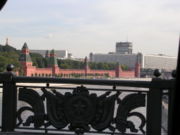UK architect Norman Foster’s design for a complex overlooking Red Square in Moscow gets a bit of a slam in Thursday’s NY Times, unless “glorified mall” is a compliment. The massive project will be the biggest development in the Russian capital since the fall of the Soviet Union, and departs from Foster’s usual ground-breaking designs, settling on a kind of neo-classical cheese. What’s interesting is the building it will replace: the legendary Hotel Rossiya.
 Once the largest hotel in Europe, the gargantuan concrete Rossiya (“Russia”) covered a whole city block and contained 3,000 rooms. I stayed in the Rossiya in 1987 during a student trip to Moscow (and what was then still called Leningrad). I was 16 years old and had heard the rooms were all bugged, so my roommate and I wrote each other notes whenever we felt our conversations were “sensitive” (like, when we wanted to talk about how we thought the rooms were bugged). Surreality abounded; an engraved metal sign in the lobby described some hotel rules or features in perfect English, except that every instance of the word “is” was spelled “iz.” My post-modern sense of design hadn’t yet been honed by Wallpaper magazine, or I would have probably been more impressed with the restaurant: a gigantic, multi-level wedge-shaped space with a ceiling covered in gold-painted cylinders of varying length, from which hung massive golden starburst chandeliers. I seem to remember light blue carpet, too. Today it could have been the coolest ironic nightclub in the world.
Once the largest hotel in Europe, the gargantuan concrete Rossiya (“Russia”) covered a whole city block and contained 3,000 rooms. I stayed in the Rossiya in 1987 during a student trip to Moscow (and what was then still called Leningrad). I was 16 years old and had heard the rooms were all bugged, so my roommate and I wrote each other notes whenever we felt our conversations were “sensitive” (like, when we wanted to talk about how we thought the rooms were bugged). Surreality abounded; an engraved metal sign in the lobby described some hotel rules or features in perfect English, except that every instance of the word “is” was spelled “iz.” My post-modern sense of design hadn’t yet been honed by Wallpaper magazine, or I would have probably been more impressed with the restaurant: a gigantic, multi-level wedge-shaped space with a ceiling covered in gold-painted cylinders of varying length, from which hung massive golden starburst chandeliers. I seem to remember light blue carpet, too. Today it could have been the coolest ironic nightclub in the world.
The Rossiya is now almost completely demolished, and I’m oddly nostalgic, although as the Times notes, it’s best not to be sentimental about architecture in Moscow. The city seems bent on replicating the worst mistakes of capitalism while erasing any evidence of Communism, leaving a kind of Tsarist Disneyworld. The Times ends the article optimistically, noting the emergence of Russian architectural preservationism and the historical accuracy of some aspects of Foster’s plan. But one look at the under-construction Federation Tower (whose promotional lighting has inspired Muscovites to call it “Mordor Disco”) and I can’t help but feel a sense of vertigo, as Moscow hurtles down a path to who knows where.















